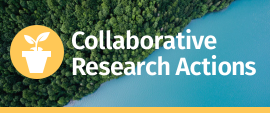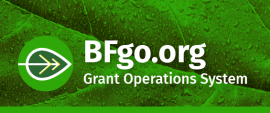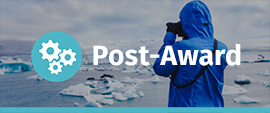Data Policies and Principles
Recognizing the crucial role of open and effective data and information exchange to the Belmont Challenge, the Belmont Forum adopted open Data Policy and Principles based on the recommendations from the Community Strategy and Implementation Plan (CSIP) at its 2015 annual meeting of Principals in Oslo, Norway. The policy signals a commitment by funders of global environmental change research to increase access to scientific data, a step widely recognized as essential to making informed decisions in the face of rapid changes affecting the Earth’s environment.
Belmont Forum Data Policy and Principles
The Belmont Forum adopts this data policy and the following principles to widen access to data and promote its long-term preservation in global change research; help improve data management and exploitation; coordinate and integrate disparate organizational and technical elements; fill critical global e-infrastructure gaps; share best practices; and foster new data literacy.
The Belmont Forum recognizes that significant advances in open access to data have been achieved and implementation of this policy and these principles requires support by a highly skilled workforce. The Belmont Forum recommends a broad-based training and education curriculum as an integral part of research programs and encourages researchers to be aware of, and plan for, the costs of data intensive research. The Belmont Forum’s ambition is that this policy and these principles will take positive steps toward establishing a global, interoperable e-infrastructure based on cost-effective solutions that can help enable actionable and societally beneficial science.
Data should be:
- Discoverable through catalogues and search engines
- Accessible as open data by default, and made available with minimum time delay
- Understandable in a way that allows researchers—including those outside the discipline of origin—to use them
- Manageable and protected from loss for future use in sustainable, trustworthy repositories
The Belmont Forum and its members will support and promote this data policy and principles with the intent of making these data principles enforceable over time.
“This policy of openness paves the way for science and funding agencies collaborating internationally to reinforce the excellence and integrity of science,” said Kurt Vandenberghe, then co-chair of the Belmont Forum. “It will facilitate innovation through taking advantage of research data and results and, most of all, it will enhance global scientific collaboration and science diplomacy as essential conditions for developing more sustainable societies.”
Additional Detail
The Policy and Principles closely follow the data principles promoted in the CSIP:
Research data must be:
- Discoverable through catalogues and search engines, with data access and use conditions, including licenses, clearly indicated. Data should have appropriate persistent, unique and resolvable identifiers.
- Accessible by default, and made available with minimum time delay, except where international and national policies or legislation preclude the sharing of data as Open Data. Data sources should always be cited.
- Understandable and interoperable in a way that allows researchers, including those outside the discipline of origin, to use them. Preference should be given to non-proprietary international and community standards via data e-infrastructures that facilitate access, use and interpretation of data. Data must also be reusable and thus require proper contextual information and metadata, including provenance, quality and uncertainty indicators. Provision should be made for multiple languages.
- Manageable and protected from loss for future use in sustainable, trustworthy repositories with data management policies and plans for all data at the project and institutional levels. Metrics should be exploited to facilitate the ability to measure return on investment, and can be used to implement incentive schemes for researchers, as well as provide measures of data quality.
- Supported by a highly skilled workforce and a broad-based training and education curriculum as an integral part of research programs.
For additional details or to get involved, please contact the Secretariat.
Dataset Catalog
A number of Belmont Forum supported projects have made datasets open access in line with the Belmont Forum’s Data Policies and Principles. It is hoped that researchers will take advantage of the open access datasets to enhance scientific collaboration and advance the Belmont Challenge.
To view the Belmont Forum Dataset Catalog please click here.
Policy Comparison Tool
| Title |
History
The Belmont Forum e-Infrastructures and Data Management Collaborative Research Action (CRA) leveraged worldwide conversations on data sharing e-infrastructures to coordinate open access to transdisciplinary research data generated by Belmont Forum projects. In October 2015, the Belmont Forum adopted a Data Policy and Principles to promote data sharing and reuse among their 25+ international science funding agencies and research partners. These open data principles were recommended in the “Community Strategy and Implementation Plan,” the report released in 2015 from the scoping phase of the project. Work was undertaken as four independent but interrelated Action Themes to identify, evaluate and adopt global best practices in e-infrastructures and data management for Belmont Forum projects.
History of the eIDM CRA
In 2013, the Belmont Forum initiated the e-Infrastructures and Data Management CRA, which brought together domain scientists, computer and information scientists, legal scholars, social scientists, and other experts from more than fourteen countries to establish recommendations on how the Belmont Forum can implement a more coordinated, holistic, and sustainable approach to the funding and support of global change research.
The e-Infrastructures and Data Management Scoping Phase (October 2013 – April 2015) produced a Community Strategy and Implementation Plan (CSIP) that outlines actions necessary to achieve convergence on paths toward open access to research data.
The Belmont Forum Secretariat fulfilled the CSIP’s first recommendation by adopting a Data Policy and Principles in October 2015.
Implementation
Actions during the Implementation Phase (2016-2019) align and leverage existing breakthroughs in data sharing in order to facilitate Belmont Forum researchers and stakeholders access to and reuse of data generated by Belmont Forum projects. Recommendations from this project influence how the Belmont Forum operates by promoting more coordinated and sustainable policies, procedures and funding mechanisms to support global e-infrastructure for global change research.
Areas of development are defined by four Action Themes:
1. Coordination: A virtual Communication, Collaboration, and Coordination Office (known as the C3O, or Coordination Office) fosters ongoing communication and collaboration among the e-I&DM Action Themes and the public, and identifies opportunities for coordination among existing e-infrastructure initiatives.
2. Data Planning: The Data Planning Theme helps promote active and effective data management and stewardship in all Belmont Forum funded research throughout the research life cycle, and works to enable harmonization of e-infrastructures through enhanced project data planning, monitoring, review and sharing. The Data and Digital Outputs Management Plan Annex asks questions to help researchers think about how to prepare and manage their project outputs to conform to the Belmont Forum Open Data Policy and Principles.
3. e-Infrastructures: e-Infrastructures development is tasked with identifying the most critical barriers to data sharing and developing best practices using case-based evidence in order to facilitate adherence to the Belmont Forum open Data Policy and Principles. The Science-Driven e-Infrastructure Development (SEI) CRA was released by Belmont Forum on 16 April 2018.
4. Capacity Building: The Capacity Building Theme aims to develop a workforce that can combine a well-developed understanding of environmental, social and health science with skills in data science, data-handling and computational methods and technologies through coordinated training. The Data Skills Curricula Framework Full Report describes a capacity building plan that would equip Belmont Forum researchers with skills to successfully undertake data-enabled science projects. These course subjects are also listed in the Data Skills Curricula Framework Outline. Training materials to enable Belmont Forum researchers to create and carry out a successful Data and Digital Outputs Management Plan according to the Belmont Forum Data Policy and Principles are compiled in the online Data Skills Toolkit. A video playlist: DMP Development for Researchers present three online video training modules discussing the whys, hows, and basic considerations of data management and sharing.
These actions work concurrently to strive towards coordinated data management and sharing practices among Belmont Forum researchers, agencies, and users of Belmont Forum outputs.
Timeline
The e-Infrastructures and Data Management project consisted of scoping activities and has produced a Community Strategy and Implementation Plan (CSIP). This report identified funding investments and strategic science policies that the Belmont Forum can implement to support global change research in a multilateral way.
This timeline lists the most recent activities of the e-Infrastructures and Data Management at the top. Please scroll down for older activities.
August 31, 2019: e-I&DM Coordination Office transfers data management material and approaches to the Belmont Forum Secretariat and the project officially ends.
June 6, 2019: Information on the Data Accessibility Statement included as part of an Open Access Scholarly Publishers Association (OASPA) webinar.
June 3, 2019: Data Management Training videos on development of a project Data Management Plan and exploration of the Data Management Toolkit are released on Belmont Forum YouTube channel.
May 14, 2019: Formal Data Management Planning training module presented by Human Dimensions champion Dr. Wade Bishop at the kickoff meeting of the BioDivScen II Collaborative Research Action in Helsinki, Finland. Information on creation of a Data and Digital Outputs Management Plan and the Data Management Toolkit was presented in conjunction with additional data-related topics designed by the CRA management team.
April 10, 2019: Release of four Integrated Training: Research Goals and Methods narrated slideset videos co-produced by Belmont Forum and collaborating organizations such as START, the International Science Council, and Future Earth on the Belmont Forum official YouTube channel. Video topics include: 1) What is Transdisciplinary Research; 2) Principles and Process of Transdisciplinary Research; 3) Information Management; 4) Outputs and Communication.
February 2019: Data Management Toolkit released.
January 2019: Discussion with GoFAIR leaders at a GoFAIR coordination meeting in Leiden, Germany about possibilities for converging open data tools and processes among Global FAIR practices and Belmont Forum. ESIP training clearinghouse
December 2018: Participation by the e-I&DM team and associates in two town hall sessions, four oral sessions, and two poster sessions at the American Geophysical Union Fall Conference in Washington, D.C. (Read more information on AGU 2018 Fall Meeting participation.)
December 2018: In-person interaction, including live presentation and Q&A with researchers from Arctic, Mountains, and Food Security CRAs at the 2018 Belmont Forum Mid- and End-term Valorisation Meeting in Washington, DC.
November 2018: Formal presentations on curricula development, transdisciplinary research, and data management in the publishing community given at the 2018 International Data Week/SciDataCon in Gaborone, Botswana, by project coordinator Rowena Davis, Human Dimensions Champion Wade Bishop, and Publishing Policy Project Lead Fiona Murphy.
October 29-November 2, 2018: Coordination Officer Bob Samors attended GEO Week in Tokyo, Japan to join discussion on global open data approaches and goals.
October 2018: Formal presentation at the annual Belmont Forum 2018 Plenary in London, UK to summarize achievements on all four Action Themes, as well as seek endorsement for deliverables such as the Data Accessibility Statement.
October 1, 2018: Release of the Data Accessibility Statement developed in partnership with representatives from the science publishing community.
April 19, 2018: Curricula Framework Implementation Webinar, providing background on the Data Skills Curricula Framework and describing how the ESIP training clearinghouse is a resource for agencies interested in implementing training to meet needs in Human Dimensions.
April 25, 2018: Call for Belmont Forum Science-Driven e-Infrastructures Collaborative Research Action opened to support development of data and e-Infrastructure tools for Belmont Forum research.
June 3-8 2018: e-Infrastructure (Action Theme 3) collaborators Ming Hsu Li, Bob Samors, Jean Pierre Vilotte presented at the Asia Oceanic Geosciences Conference in Honolulu, Hawaii.
February 27-29, 2018: Data Publishing Policy Project Lead Fiona Murphy, Sarah Callagahan, and Bob Samors held a workshop at the Researcher to Reader Conference in London, UK.
December 12, 2017: The extended e-I&DM team presented two sessions and one panel presentation on Data Citation; one Town Hall, Exhibitor Booth, panel appearance at Data FAIR discussion at 2017 American Geophysical Union Fall Meeting in New Orleans, LA.
October 4-6, 2017: Coordination Officer Bob Samors participated in a workshop on “exchanging information about data-literature links at the RDA/WDS Scholarly Link Exchange (Scholix) WG in Pisa, Italy.
June 23, 2017: The Data Planning Action Theme, with the generous support of the Institute of Physics, hosted an Open Data Publishing Policy Workshop in London, England to explore the role for and contributions by publishers in the realm of open research data.
April 29, 2017: The Coordination Office (C3O) hosted the Secretariat Coordinating Group and Oversight Committee at a meeting in Vienna, Austria to evaluate project progress, identify internal and external points of collaboration, and determine next steps.
April 28, 2017: Capacity Building Action Theme hosted a Data Skills Curricula Development Workshop in Vienna, Austria adjacent to EGU 2017. The workshop gathered 25+ experts in data management and e-infrastructures training to analyse the results of a skills gap survey and determine priorities and pathways for developing an effective training curriculum for Belmont Forum researchers.
March 2017: Barron Orr joined project as U.S. co-lead.
March 2017: Data Planning Action Theme releases V1 of a data management template to guide data management planning for potential Belmont Forum projects during the pre-proposal stage.
December 2016: Members of the Coordination Office (C3O) and the Belmont Forum jointly hosted a booth at AGU 2017; C3O members presented the poster “Collaborative Development of e-Infrastructures and Data Management Priorities for Global Change Research.”
November 2016: Capacity Building Action Theme circulated a Data Skills Gap Survey (now closed) to data managers and scientific researchers to determine initial gaps in training and barriers to data sharing from a human dimensions viewpoint.
November 2016: 40+ participants (funded project PIs and team members, observers, and potential collaborators) met at 2-day Exemplars Scoping Workshop in Paris to identify most pressing data management challenges, barriers and possible solutions that will form the basis for a possible 2017 Belmont Forum call. Workshop sponsored and organized by e-Infrastructures Action Theme leaders Jean-Pierre Vilotte and Mark Asch of ANR/France.
September 2016: The Secretariat Coordinating Group and Oversight Committee met in Denver, Colorado, USA, during International Data Week to plan and coordinate execution of the upcoming Exemplars Workshops (AT3); discussions with potential collaborators (GEO, RDA, ICSU-WDS, Future Earth, and CODATA, others) regarding potential synergies for development of policies and guidelines for Data Security and Data Publishing.
March 2016: The Phase II Implementation Plan describing activities to be undertaken was released.
End Scoping Phase (Phase I)
December 2015: The Phase I participants held their final in-person meeting in San Francisco, USA, the weekend before the American Geophysical Union (AGU) Fall Meeting. The purpose was to define the path for the successful delivery of the Community Strategy and Implementation Plan.
October 2015: The Belmont Forum Annual Meeting in Oslo, Norway. The Belmont Forum reviewed and accepted the Community Strategy and Implementation Plan, officially adopting a Data Policy and Principles to encourage access to and reuse of research data. Planning began immediately for execution of four Action Themes to implement the project on a global level.
August 2015: The Secretariat released a Community Edition of the Community Strategy and Implementation Plan to summarize the final report while giving added context for the general reader. The Secretariat circulated the Community Strategy and Implementation Plan and slidesets among the broader global change research community and policymakers.
June 30, 2015: The Steering Committee and the Secretariat submitted the final Community Strategy and Implementation Plan to the Belmont Forum.
June 2015: The Secretariat and Steering Committee incorporated feedback and drafted the Community Strategy and Implementation Plan for final review.
May 2015: The draft Community Strategy and Implementation Plan was circulated among Work Package members for feedback and review.
April 13-16, 2015: The Secretariat held a writing session immediately following the Steering Committee meeting to draft the Community Strategy and Implementation Plan.
April 9-11, 2015: The Steering Committee held its fifth in-person meeting at the Japan Science and Technology Agency (JST) in Tokyo, Japan, to review and finalize recommendations and actions for inclusion in the Community Strategy and Implementation Plan.
December 13-14, 2014: The Steering Committee held its fourth in-person meeting just prior to the American Geophysical Union (AGU) Fall Meeting in San Francisco, USA. This meeting was hosted by the US Secretariat. Key outcomes are summarized in the meeting report.
November 2014: The Belmont Forum provided positive feedback on the Interim Report with guidance for the final Community Strategy and Implementation Plan.
October 8-10, 2014: The Belmont Forum reviewed the Interim Report during its annual meeting in Beijing, China.
September 2014: The Steering Committee and Secretariat submitted the Interim Report to the Belmont Forum.
August 21-22, 2014: The Steering Committee held its third in-person meeting in Paris, France at the ICSU World Headquarters to synthesize Work Package findings into a cohesive interim report outlining initial Work Package conclusions and proposed actions.
April 26-27, 2014: The Steering Committee co-located its second meeting just prior to the European Geosciences Union (EGU) General Assembly in Vienna, Austria. This meeting successfully achieved its goals: review the project timeline and deliverables; report on Work Package progress; share best practices and lessons learned; identify synergies, overlaps, and gaps; identify emerging ideas, concepts and issues, and their potential impact on project deliverables. The full meeting report is available in the document repository.
February 2014 – March 2015: Work Package scoping activities began. Most activities were carried out virtually and consisted of teleconferences, shared online discussion boards and shared documents (such as inventories and reports). Some Work Packages held in-person meetings. Group of Program Coordinators members also held virtual and in-person meetings to support their national delegations, with the aim of promoting greater understanding of the role of the Work Packages and the project as a whole.
November 2013 – February 2014: Each participating Belmont Forum member finalized their national delegation (approximately 10 experts per country), forming a 120+ member Assembly. Assembly members were divided among the six Work Packages. Work Package work plans were finalized and accepted by the Belmont Forum Group of Program Coordinators (funding agency representatives).
October 2013: Steering Committee members met in Windsor, United Kingdom, to define Work Package focus areas and determine Work Package leadership. Six Work Packages were formed, each to be led by at least one Steering Committee member. Key outcomes are summarized in the full meeting report.
August 2013: Steering Committee members were selected by participating Belmont Forum members (one per participating Belmont Forum member).
June 2013: The joint United States-United Kingdom Secretariat was formed, led by Lee Allison of the Arizona Geological Survey (US), and Robert Gurney of the University of Reading (UK).
Participating Countries
Primary Funders (Implementation Phase)
ACTION THEMES 1, 2, & 4 |
|
 |
United States of America National Science Foundation (NSF) |
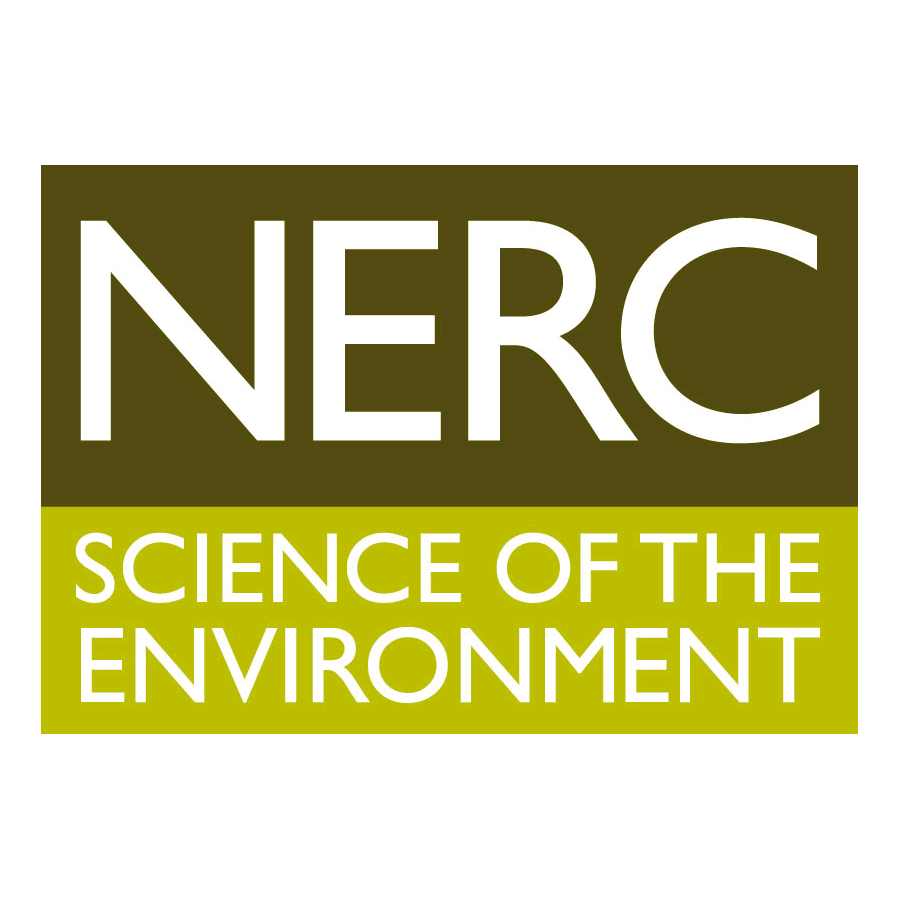 |
United Kingdom Natural Environment Research Council (NERC) |
ACTION THEME 3 |
|
 |
France National Research Agency (ANR) |
 |
Japan Japan Science and Technology Agency (JST) |
 |
China Ministry of Science and Technology (MOST) |
Scoping Phase ContributorsThe Scoping Phase of the e-Infrastructures and Data Management Collaborative Research Action was supported by the following participating Belmont Forum members: |
|
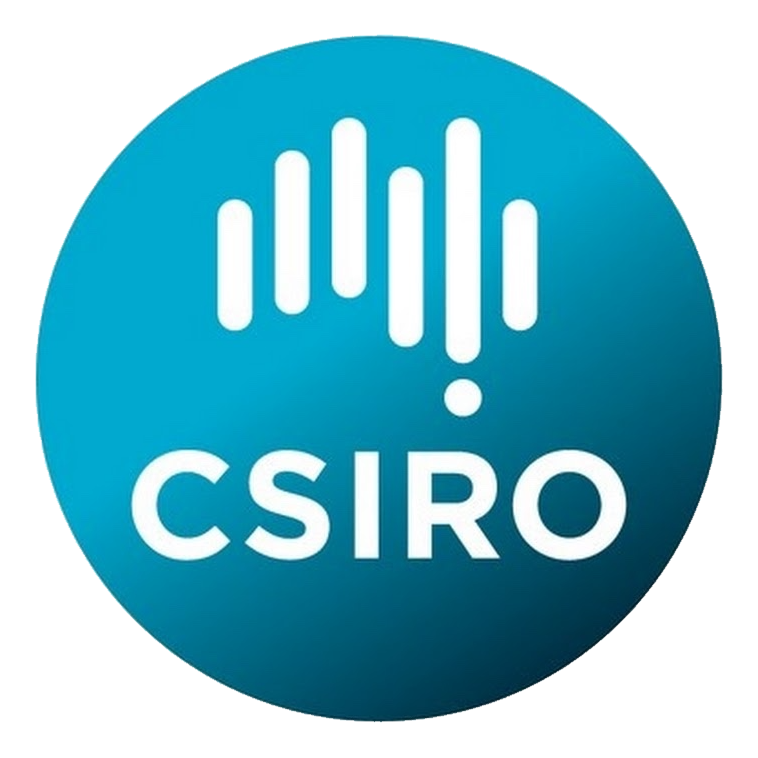 |
Australia Commonwealth of Scientific and Industrial Research Organization (CSIRO) |
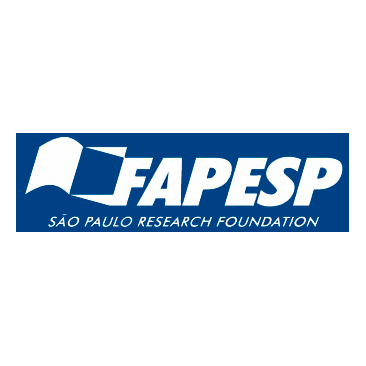 |
Brazil Sao Paulo Research Foundation (FAPESP) |
 |
European Commission |
 |
France National Research Agency (ANR) |
 |
Germany Federal Ministry of Education and Research (BMBF) |
 |
Germany Deutsche Forschungsgemeinschaft (DFG) |
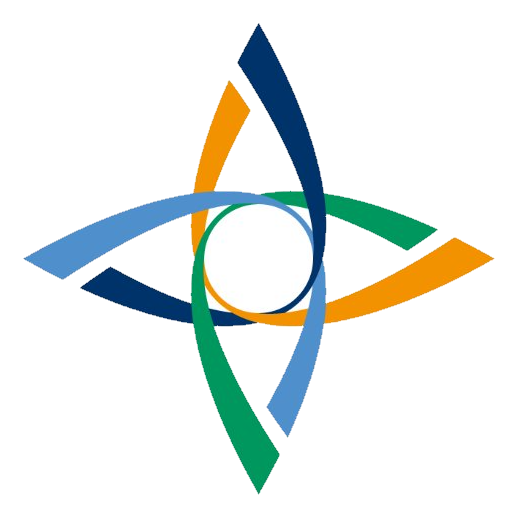 |
International Council for Science (ICSU) |
 |
Italy National Research Council (CNR) |
 |
Japan Japan Science and Technology Agency (JST) |
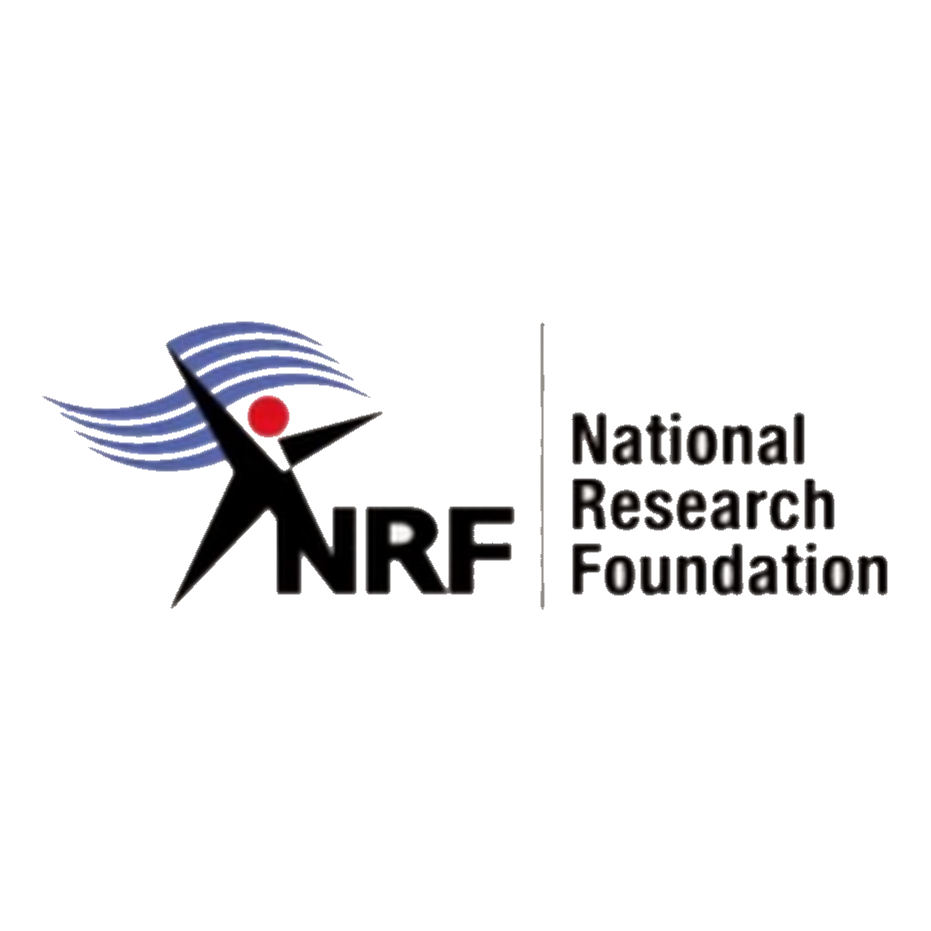 |
South Africa National Research Foundation (NRF) |
 |
United Kingdom Natural Environment Research Council (NERC) |
 |
United States of America National Science Foundation (NSF) |
e-I&DM Team
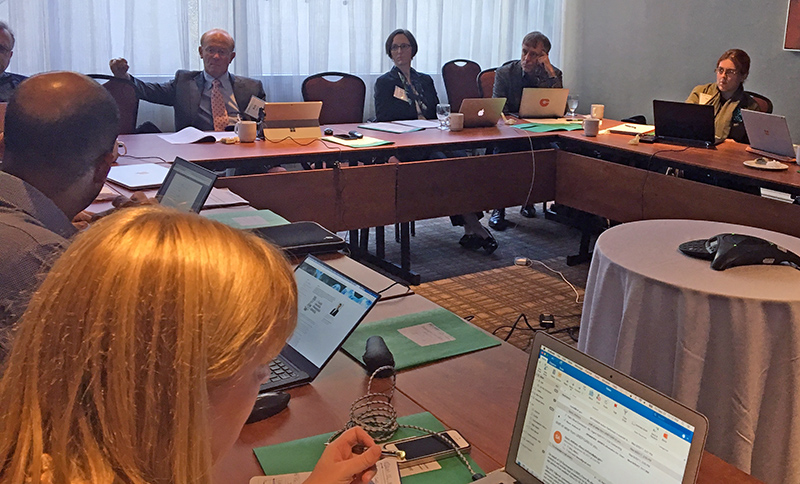
The Implementation Phase of the e-Infrastructures and Data Management project was driven by a Secretariat Coordinating Group made up of Champions representing each of the four Action Themes, the Coordination Officer, the Data Information Officer, support staff, and representatives from the Belmont Forum Secretariat. Meetings were held on a regular basis to make sure the work themes were working in conjunction with each other to the greatest extent possible. Learn more about the Secretariat Coordinating Group members below.
Action Theme 4: Capacity Building & Human Dimensions
Wade Bishop
Human Dimensions/Capacity Building Champion (2018-2019)
Associate Professor, School of Information Sciences
University of Tennessee, Knoxville, US
https://sis.utk.edu/profile/wade-bishop
Action Theme 1: Coordination
Bob Samors
Coordination Officer
External Relations, Communications, Partnerships
Italy
earthobservations.org
Action Theme 1: Coordination
Rowena Davis
Project Coordinator
Arizona Geological Survey
US
azgs.arizona.edu
Action Theme 1: Coordination
Tina Lee
Project Coordinator
Arizona Geological Survey
US
azgs.arizona.edu
Action Theme 2: Data Planning
Fiona Murphy, Ph.D
Publishing Liaison
Scientific publishing
Action Theme 3: e-Infrastructures
Ming-Hsu Li
SCG representative of MoST
Hydrology
National Central University
Chinese Taipei
Action Theme 3: e-Infrastructures
Jean-Pierre Vilotte
e-Infrastructures Champion
Director of the Seismology Department
Institut de Physique du Globe de Paris
France
www.ipgp.fr/en
Emeritus Team Members
Robert Gurney
Former Project co-lead (2013-2017)
University of Reading
Professor and Academic Lead for Space/Earth Observation Research
United Kingdom
The National Centre for Earth Observation
Lee Allison
US Principal Investigator, Steering Committee Co-Chair, WP 6 Co-Lead
Arizona Geological Survey
State Geologist & Director (2005-2016)
US
Action Theme 4: Capacity Building & Human Dimensions
Vicky Lucas
Human Dimensions/Capacity Building Champion (2016-2017)
Institute for Environmental Analytics
UK
Mustapha Mokrane
Project Lead
Executive Director
ICSU-WDS International Programme Offices
Japan
icsu.org
Oversight Committee
The objective of the Oversight Committee (OC) was to provide guidance and input from the perspective of both the Belmont Forum members and the scientific and technical communities most affected by the outcomes of the e-I&DM Project. The OC will review scientific drivers and priorities, provide scientific and technical feedback, and perform special assignments as requested by Belmont Forum or e-I&DM leadership.
FutureEarth
Oversight Committee Member
FutureEarth is a major international convener that fosters a culture of engaged research based on the co-design and co-production of knowledge and tools and works to incorporate the latest research findings into government, business and community decisions and policies. The organization builds on the work of 20 long-term Global Research Projects to accelerate transformations to sustainability through research and innovation.
RDA
Oversight Committee Member
The Research Data Alliance (RDA) was launched as a community-driven organization in 2013 by the European Commission, the United States Government’s National Science Foundation and National Institute of Standards and Technology, and the Australian Government’s Department of Innovation with the goal of building the social and technical infrastructure to enable open sharing of data. With close to 6,900 members from 137 countries (April 2018), RDA provides a neutral space where its members can come together through focused global Working and Interest Groups to develop and adopt infrastructure that promotes data-sharing and data-driven research, and accelerate the growth of a cohesive data community that integrates contributors across domain, research, national, geographical and generational boundaries.
ICSU-WDS
Oversight Committee Member
The World Data System (WDS) is an Interdisciplinary Body of the International Science Council (ISC) created by its 29th General Assembly in Maputo, Mozambique in 2008. The mission of the World Data System is to support ISC’s vision by promoting long-term stewardship of, and universal and equitable access to, quality-assured scientific data and data services, products, and information across a range of disciplines in the natural and social sciences, and the humanities. WDS aims to facilitate scientific research under the ISC umbrella by coordinating and supporting trusted scientific data services for the provision, use, and preservation of relevant datasets, while strengthening their links with the research community.
GEO
Oversight Committee Member
The Group on Earth Observations (GEO) is a partnership of more than 100 national governments and in excess of 100 Participating Organizations that envisions a future where decisions are informed by coordinated, comprehensive and sustained Earth observations. GEO’s global network connects government institutions, academic and research institutions, data providers, businesses, engineers, scientists and experts to create innovative solutions to global challenges at a time of exponential data growth, human development and climate change that transcend national and disciplinary boundaries. The unprecedented global collaboration of experts helps identify gaps and reduce duplication in the areas of sustainable development and sound environmental management.
News
30 Aug 2019 - Transition of e-I&DM Coordination Office
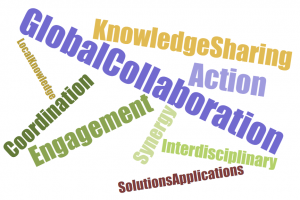 The Belmont Forum e-Infrastructures and Data Management (e-I&DM) team announced the official transition of the e-Infrastructures and Data Management Project on 31 August, 2019.
The Belmont Forum e-Infrastructures and Data Management (e-I&DM) team announced the official transition of the e-Infrastructures and Data Management Project on 31 August, 2019.
Throughout the spring and summer, the Coordination Office has been working with the Belmont Forum Secretariat to transfer resources and integrate training and evaluation opportunities into the Belmont Forum research and development process. The products and collaborations forged by this project provide a solid foundation for the continued growth for the culture and mechanics of Open Data, and firm steps toward the achievement of the Belmont Forum Open Data Policy and Principles (2015), which advocate for rigorous, full-lifecycle research data management, data sharing, and open science, and are closely aligned with the FAIR Data Principles (Findable, Accessible, Interoperable, Reusable) published by Force-11 in 2016.
A major step toward the goals of the Open Data Policy and Principles can be achieved by deploying cohesive, consistent data management requirements, training, and evaluation tools for all future Belmont Forum CRAs. Guided by the insightful outcomes of the e-I&DM Scoping project (2013-2015), materials and resources we have developed work together to provide a coherent path toward Open Data. Data management considerations introduced via the Data and Digital Outputs Management Plan Annex are made achievable through the training tools available in the online Data Management Toolkit and the BF Data Management Training Modules. The Data Management Plan Scorecard is designed to help research teams and project evaluators understand and quantify successful approaches to data management.
It is imperative that Belmont Forum, its Plenary, and partners collectively act to move the Belmont Forum community forward on these goals.
e-Infrastructures and Data Management resources produced by the project include:
- Data and Digital Outputs Management Plan Annex (DDOMP)
- Data Management Plan Scorecard
- Online Data Management Toolkit
- BF Data Management Training Modules (Playlist on Belmont Forum YouTube Channel)
- Data Accessibility Statement (DAS) template
- Data Skills Curricula Framework
- Transdisciplinary Research and Data Management Slide Presentation (Playlist on YouTube Channel)
- Data Policy Comparison Tool
- Evaluation Metrics White Paper
Global Collaboration
Belmont Forum contributors to the e-I&DM project included members from the U.S. National Science Foundation (NSF), UK Natural Environmental Research Council (NERC), France’s Agence Nationale de Recherche (ANR), Chinese Taipei’s Ministry of Science and Technology (MoST), and the Japan Science and Technology Agency (JST).
Together, this multinational, interdisciplinary team coordinated outreach and collaborations with international data and environmental research groups to identify best practices for data management and developed numerous resources for the Belmont Forum for capacity building, researcher and agency training, proposal development/evaluation, research data publication, and programmatic evaluation metrics. Key deliverables of these efforts included:
- Data and Digital Outcomes Management Plan (DDOMP) template that member agencies may use as the basis for a Data Management Requirements Annex to CRA funding calls;
- Data Management Plan (DMP) Scorecard for proposal reviewers, Belmont Forum Secretariat, or others to quantitatively evaluate completeness of DMPs submitted with proposals relative to DDOMP criteria;
- Data Accessibility Statement (DAS) template that specifies how to access data underlying the research being published, intended for research teams to use when publishing research funded by Belmont Forum in scholarly journals;
- Data Management Skills Curricula Framework that outlines basic curricula/topics/skills to ensure a minimum level of knowledge required to conduct data-enabled science;
- Online Data Management Toolkit as a resource for Belmont Forum and others to find basic training materials and resources;
- Data Management Training Module for introductory training of Belmont funders, researcher-proposers, Group of Program Coordinators, Theme Program Officers, etc. on data management issues;
- Transdisciplinary Research and Data Management slide presentation co-developed with START, FutureEarth, and International Science Council;
- Evaluation Metrics White Paper outlining metrics to measure progress towards implementation of the Open Data Policy and Principles;
- Data Policy Comparison Tool that enables users to compare up to 3 member agency data policies simultaneously when considering CRA funding requirements;
- Presentations, posters, and papers by the project team given at international and domestic conferences to communicate to the research community and the broader public on efforts and outcomes of the e-I&DM project.
Another key e-I&DM activity, led by ANR, MoST, and JST, was to develop and manage a separate Belmont Forum funding call to identify best practices and innovative science-driven e-infrastructures to enable international research data sharing. The outcome of this effort is the Science-driven e-Infrastructure Innovation for Enhancement of Transnational, Interdisciplinary and Transdisciplinary Data User in Environmental Change (SEI CRA), announced in 2017 with funding support from five member agencies; three projects were awarded in 2018 under this call.
Project coordination, communication and collaboration, led by NSF’s awardee Arizona Geological Survey, involved international data and research groups, interest/working groups, and individuals affiliated with including, but not limited to:
- American Association for the Advancement of Science Research Fellows
- American Geophysical Union
- Citizen Science Organization
- CODATA
- DataONE
- EarthCube
- Earth Science Information Partners
- European Commission
- European Geophysical Union
- European Open Science Cloud
- European Space Agency
- FutureEarth
- GoFAIR
- Group on Earth Observations
- International Science Council-World Data System
- Lux Consulting Group, Inc.
- Open Access Scholarly Publishers Association
- Open Research Funders Group
- Organization for Economic Cooperation and Development
- Research Data Alliance
- Society of Scholarly Publishing
- START International
- U.N. Convention to Combat Desertification
- U.N. Division of Sustainable Development Goals
- U.N. Statistics Commission
- U.S. Global Change Research Program
- World Meteorological Organization
Special thanks to Mark Asch, Wade Bishop, Sarah Callaghan, Makyba Charles-Ayinde, Matt Dobson, Rorie Edmunds, Susanna Ehlers, Johnny Erickson, Robert Gurney, Hannah Gunderman, Kate Hamer, Hilary Hanahoe, Hiede Hackmann, Simon Hodson, Nancy Hoebelheinrich, Iain Hrynaszkiewicz, Erica Key, Katie Kinsley, Soichi Kubota, Mohan Koo, Ming-Hsu Li, Vicky Lucas, Catriona Maccallum, Rauri Macdonald, Roel Marsman, Raleigh Martin, Mustapha Mokrane, Fiona Murphy, Clemenr Ng, Barron Orr, Mark Parsons, Erin Robinson, Barbara Ryan, Bob Samors, Carrie Seltzer, Hugh Shanahan, Shelley Stall, Mao Takeuchi, Josh Tewksbury, Mark Thorley, Maria Uhle, Judit Ungvari, Jean-Pierre Vilotte, Lesley Wyborn, participants in e-I&DM workshops and working groups, contributors to the e-I&DM Scoping Project (2013-2015), many other individuals, and to the memory of Lee Allison.
The key outcome and most important legacy of this extensive coordination effort is the widespread international recognition of the Belmont Forum as a leader in Open Data policy, practices and resources for international, transdisciplinary global change research.We hope you will share in our pride that a key outcome and important legacy of this extensive coordination effort is the widespread international recognition of the Belmont Forum as a leader in Open Data policy, practices and resources for international, transdisciplinary global change research.
For data management support within the Belmont Forum, please inquire at belmontforum.org.
25 Apr 2018 - Call for ProposalScience-driven e-Infrastructureand Innovation
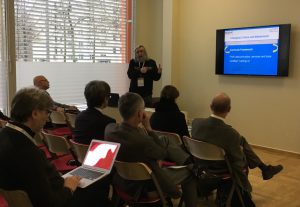 On 16 April 2018, the Belmont Forum released a Collaborative Research Action funding opportunity designed to address data-related challenges in Belmont Forum research and directly contribute to sustainable e-Infrastructure solutions and practices. This action is an integral part of the Community Strategy and Implementation Plan released by the e-Infrastructures and Data Management project in 2015 as the final report of the Scoping Phase. Development of the funding call was led by e-Infrastructures Champion Jean Pierre Vilotte of ANR (Action Theme 3). Dr. Vilotte describes the funding opportunity below:
On 16 April 2018, the Belmont Forum released a Collaborative Research Action funding opportunity designed to address data-related challenges in Belmont Forum research and directly contribute to sustainable e-Infrastructure solutions and practices. This action is an integral part of the Community Strategy and Implementation Plan released by the e-Infrastructures and Data Management project in 2015 as the final report of the Scoping Phase. Development of the funding call was led by e-Infrastructures Champion Jean Pierre Vilotte of ANR (Action Theme 3). Dr. Vilotte describes the funding opportunity below:
On behalf of the e-Infrastructures and Data Management team and our partners at Ministry of Science and Technology (Chinese Taipei), Japan Science and Technology, U.S. National Science Foundation, and FAPESP Brazil, I am pleased that the call for proposals for Science-driven e-Infrastructure and Innovation (SEI CRA) has been released. This call is a concrete step towards lowering the barriers for transnational open data and data-intensive analytics in Belmont Forum-funded research, and signifies the critical role of science-driven technologies and infrastructures in that process.
Read Call Documents.
During the 4-year implementation of the SEI CRA, there will be continuous steering activity led by a Task Force to co-implement the CRA with the funded projects, e-I&DM team, international experts and representatives from pertinent organisations such as RDA, CODATA, ICSU-WDS and GEO. This steering activity, and the yearly workshops, give us a unique opportunity to monitor and integrate the projects’ Data and Digital Outputs Management Plans (DDOMP) as they evolve. This, for me, is the most important process to make Data Management Plans concrete and alive. An important objective too, is to acculturate researchers toward transnational open data sharing and open science, together with accelerating the rate at which new information can be gleaned from transnational data with innovative e-infrastructures and data-intensive methods for fundamental research to address society’s urgent need for solutions to global changes.
— Jean-Pierre Vilotte, ANR, e-I&DM Champion for e-Infrastructures (above, presenting SEI CRA at RDA P-11, Berlin)
27 Oct 2017 - Mustapha Mokrane Succeeds Robert Gurney as Co-Lead of Belmont Forum Open Data Initiative

Dr. Mustapha Mokrane
The Belmont Forum is pleased to announce that Dr. Mustapha Mokrane, Executive Director of ICSU World Data System, has been selected as Co-Lead of the e-Infrastructures and Data Management Project (e-I&DM). Dr. Mokrane will succeed Dr. Robert Gurney, co-creator of the initiative, who completed his term as Co-Lead at the end of September. Dr. Mokrane will continue his tenure as WDS Executive Director.
Dr. Mokrane has been involved in e-I&DM Project since its inception and contributed significantly to the report “A Place to Stand: Community Strategy and Implementation Plan,” which culminated in the Belmont Forum’s adoption in 2015 of Data Principles and Policy, a significant pivot towards open data and open science in transnational, transdisciplinary global change research. Dr. Mokrane brings over 13 years of professional experience in research data stewardship and Information and Communication Technologies. His scientific background covers genetics and bioinformatics and he holds a PhD in Molecular Biology from the Aix-Marseille University.

Dr. Robert Gurney
As we welcome Dr. Mokrane, the e-I&DM Project also bids farewell with great admiration and thanks to Dr. Gurney, whose vision was instrumental in e-I&DM’s inception, and whose has spent the past 5 years dedicated to enabling and promoting open access to research data. Dr. Gurney’s leadership was invaluable in the project’s progress from idea to a major initiative in the arena of global data science. Most recently, he has led e-I&DM’s emerging collaboration with data publishers on open access and helped secure staffing for several key positions within the Project. Robert’s legacy at e-I&DM includes his great skill at coalition-building, his affability and wit, and his mentorship of the entire team in international collaboration.
BELMONT FORUM
Formed in 2009, the Belmont Forum is a partnership of more than 25 of the world’s main funders of environmental change research and international science councils. The Belmont Forum supports transdisciplinary, transnational collaborative research programs that provide solutions-oriented research to alleviate global challenges affecting sustainable development. The goals of the Belmont Forum are aligned with wider international organizations that leverage the national and local scientific resources which maximize the value of public funding and develop local solutions that can be expanded for impact on a global scale.
In 2015, the Belmont Forum adopted an Open Data Policy and Principles in recognition of the fact that effective sharing of information is a cornerstone of scientific collaboration. This Policy strives for research data generated and used by Belmont projects to be open and accessible to stakeholders and policymakers, findable and reusable by international researchers, and interoperable to the greatest extent possible.
03 Mar 2017 - Data Planning Template Released
The Belmont Forum e-Infrastructures and Data Management team has developed a basic Data Planning Template to foster long term management and organization of project-generated data. Questions from this template have been included in the Belmont Forum Sustainable Urbanisation Global Initiative and Transformations to Sustainability Collaborative Research Actions. The template asks funded project participants to consider the type of data collected, standards and protocols used for storing data, plans for sharing, reuse, and archiving, and expected costs.
Modifications to this language are anticipated in the future as experience using the document evolves, but the release of this template is an important first step toward achievement of the Belmont Forum’s Data Policy and Principles of accessibility, interoprability, and longevity.
20 Dec 2016 - Belmont Forum Endorses Curricula Framework for Data-Intensive Research
The Belmont Forum endorsed a Data Skills Curricula Framework to enhance information management skills for data-intensive science at its annual Plenary Meeting held in November. The Framework was developed by the Forum’s e-Infrastructures and Data Management (e-I&DM) Project to improve data literacy, security and sharing in data-intensive, transdisciplinary global change research.
“For global change research to flourish, a range of skills are necessary, increasingly so in the broad area of data intensive digital skills,” stated Maria Uhle, Co-Chair of the Belmont Forum. “The Belmont Forum has developed the Curricula Framework to help provide researchers with the skills to make scientific data more accessible to other scientists for re-use, and to make that data better understood by the public and policy makers as they consider “real world” decisions regarding global environmental change.”
A skills gap survey undertaken by e-I&DM resulted in a Skills Gap Analysis which identified data complexity, lack of standards and exchange vocabulary, and data management as vital barriers to sharing and reusing data effectively. The recommended Curricula Framework core modules are designed to standardize skills of domain scientists specifically to make data handling more efficient, research more reproducible and data more shareable – including visualisations for end-users. The five core skills emphasized include programming, particulars of environmental data, visualisation, data management and interdisciplinary data exchange.
A number of optional modules are suggested for more established researchers which would be useful introductions to widen their data skills and provide new options for examining and processing data, such as machine learning and object orientated programming. Two additional modules are briefings aimed at Principal Investigators, providing an overview of data management and skills. Read more about e-I&DM curricula development and capacity building.
Developed through the Institute for Environmental Analytics for the Belmont Forum, the Framework incorporates principles adopted as best practices by global leaders in training and workforce development, including flexible options for time, duration, and location and context-based approaches to real-world, commonly encountered problems with an emphasis on fundamentals. Colin McKinnon, CEO of the Institute for Environmental Analytics, adds, “The IEA is pleased to use our expertise in environmental data analytics to identify the global training needs of Belmont Forum-funded researchers.”
About BELMONT FORUM
Formed in 2009, the Belmont Forum is a partnership of more than 25 of the world’s main funders of environmental change research and international science councils. The Belmont Forum supports transdisciplinary, transnational collaborative research programs that provide solutions-oriented research to alleviate global challenges affecting sustainable development. The goals of the Belmont Forum are aligned with wider international organizations that leverage the national and local scientific resources which maximize the value of public funding and develop local solutions that can be expanded for impact on a global scale.
In 2015, the Belmont Forum adopted an Open Data Policy and Principles in recognition of the fact that effective sharing of information is a cornerstone of scientific collaboration. This Policy strives for research data generated and used by Belmont projects to be open and accessible to stakeholders and policymakers, findable and reusable by international researchers, and interoperable to the greatest extent possible.
31 Aug 2016 - Robert Samors Appointed Coordination Officer of Belmont Forum e-Infrastructures and Data Management Project
The Belmont Forum is pleased to announce the appointment of Robert J. (Bob) Samors as Coordination Officer (CO) for the Forum’s e-Infrastructure and Data Management (eI&DM) Project. Bob brings a wealth of expertise and talent to this key position, drawing from his most recent role as Senior External Relations Manager for the Group on Earth Observations (GEO).
The Belmont Forum eI&DM project was conceived to enable an e-infrastructure that supports the data-intensive, multidisciplinary research that is needed to address current and future global change challenges. The Belmont Forum seeks to develop an integrated approach that leverages existing research infrastructures across nations and disciplines to enable the incorporation of a wide variety of data into a more usable format for decision-making.
As the Coordination Officer, Samors will liaise and coordinate with eI&DM leads and co-leads, stakeholders, Advisory Board members, and other international partners in the adoption of data principles and best practices, promotion of effective data planning and stewardship, and development of an international training curriculum to enable practitioners to put these principles and practices into action, with a goal of making these resources and practices available and implemented in Belmont Forum activities and funded projects.
Prior to his sudden death on 16 August, Dr. Lee Allison, Co-Principal Investigator of the eI&DM Project, had looked forward to Samors leading the Coordination, Collaboration and Communication Office. Dr. Allison considered Samors to be instrumental in the scoping phase of the Belmont Forum e-Infrastructure and Data Management Collaborative Research Action (BF eI&DM CRA),co-leading Work Package 4 and contributing to the development and dissemination of the Community Strategy and Implementation Plan in 2015.
In addition to designing and implementing GEO’s engagement strategy, Samors has worked closely with experts and global leaders in data and information issues across a range of governments and international scientific and technical organizations. His earlier positions have included serving as Associate Vice President for Innovation and Technology Policy at the Association of Public and Land-grant Universities (APLU), as Associate Vice President for Federal Relations for the University of North Carolina System, and as Assistant Vice President for Research at the University of Michigan. He holds a Masters in Public Policy from the Harvard University Kennedy School of Government, and a B.A. in Economics from Brown University.
Belmont Forum
The Belmont Forum represents many of the world’s largest and most influential funders of environmental and social science research. Belmont Forum members collaborate to meet the Belmont Challenge “To deliver knowledge needed for action to avoid and adapt to detrimental environmental change including extreme hazardous events.” The Belmont Forum coordinates funding for collaborative research actions (CRAs), high-priority research activities that improve the way funding agencies collaborate with each other and develop opportunities for research.
More information on the Belmont Forum is available at belmontforum.org.
The Objectives of the E-Infrastructure & Data Management Project include:
- Adopt Data Policy and Principles that establish a global, interoperable e-infrastructure with cost-effective solutions to widen access to data and ensure its proper management and long-term preservation. Researchers should be aware of, and plan for, the costs of data intensive research. (Adopted in October 2015)
- Foster communication, collaboration and coordination between the wider research community and the Belmont Forum, and across Belmont Forum projects through a Data and e-Infrastructure Coordination Office established within a Belmont Forum Secretariat.
- Promote effective data planning and stewardship in all Belmont Forum agency-funded research to enable harmonization of the e-infrastructure data layer through enhanced project data planning, monitoring, review and sharing.
- Determine international and community best practice to inform Belmont Forum research e-infrastructure policy, in harmony with evolving research practices and technologies and their interactions, through identification and analysis of cross-disciplinary research case studies.
- Support the development of a cross-disciplinary training curriculum to expand human capacity in technology and data-intensive analysis methods for global change research.
04 Aug 2016 - TEDx Talk on Satellite Data
Pierre-Philippe Mathieu, member of the Steering Committee and Work Package 1 (Data Integration for Multidisciplinary Research) gave the lecture “Taking the Pulse of Our Planet from Space” at TEDxHamburg https://www.tedxhamburg.de/en/ published on 17 July, 2016. The talk touches on how satellite data from the Copernicus mission can be shared and integrated with local knowledge to improve knowledge of Earth’s systems and quality of life.
Pierre-Philippe Mathieu is an Observation Data Scientist at the European Space Agency (ESA). Pierre-Philippe is passionate about innovation and our planet: its beauty, fragility and complex dynamics as part of an integrated Earth System. His current role is to help scientists, innovators and citizens to use high-tech (such as satellite data) to better monitor, understand and preserve our home planet, by making sustainable use of its limited natural resources.
Currently, Pierre-Philippe is working at theEuropean Space Agency (ESA) as Data Scientist to foster the use of our Earth Observation (EO) missions to support science, innovation and development in partnership with user communities, industry and businesses. His particular interest lies in addressing global environmental and development issues related to management of Food-Water-Energy resources and climate change.
This talk was given at a TEDx event using the TED conference format but independently organized by a local community.
Past Events
(There are no upcoming events)
06 Jun 2019 - OASPA Webinar
e-I&DM is proud to participate in the FREE OASPA Open Scholarship Webinar Series on “How to set up your data sharing policy.” Project coordinator Tina Lee will give a brief presentation on the Belmont Forum Data Accessibility Statement, co-developed with input from publishers. Additional presenters include Iain Hrynaszkiewicz and Shelley Stall.
Register today: This event is no longer available.
04 Dec 2018 - e-I&DM at AGU Fall Meeting
e-I&DM at AGU Fall Meeting
The Belmont Forum Secretariat and the e-I&DM team were available throughout the week at Booth #601 in the Exhibition Hall
The Belmont Forum e-I&DM team is proud to participate in several forums at the 2018 AGU Fall Meeting in Washington, DC. All attendees are invited to join the conversation about integrative data management for scientific research via the following events:
Town Halls
TH13E: International Transdisciplinary Research Approaches for Sustainable Development
- Monday, 10 December 12:30-1:30 PM – Marriott Marquis – Liberty M
- Wednesday, 12 December 12:30-1:30 PM – Marriott Marquis – Marquis 12-13
Oral Sessions
IN22A-03 – Erica Key: International Cooperation Toward FAIR Principles and Open Data in Transdisciplinary Research (10:50-11:00)
- Tuesday, 11 December, 10:50-11:00 Rm 209 A-C
- From session: Changing Culture Through Credit in Support of Enabling FAIR Data
U23A-02 – Maria Uhle: The Time is Now – Ideas for Supporting Digital Infrastructures – Lessons from the Belmont Forum (1:55-2:00)
- Tuesday, 11 December, 1:40-3:40 Rm 202A
From session: How to Support and Develop the Modern Digital Research Ecosystem to Maximize Benefits of Science for Society and the Research
IN34A – Rowena Davis (Convener): Research Data Management: Developing Standards for Data Usability and Trust and Building Capacity with Targeted Data Training for the Research Team
- Wednesday, 12 December, 4:00-6:00 Rm 206
PA54B-09 – Maria Uhle: International Research Opportunities to Help Address Global Agenda 2030
- Friday, 14 December, 5:36-5 48 PM Marriott Marquis – Marquis 1-2
- From session: International Science Addressing Global Agenda 2030
Poster Sessions
IN41E-0876 – Tina Lee, Bob Samors, Vicky Lucas: International Capacity Building to Enable Open Data for Transdisciplinary Global Change Research
- Thursday, 13 December, 8:00-12:20 Poster Hall A-C
IN41D-0878 – Bradley Wade Bishop: Bouncing the FAIR Data Principles off of Seismic Reflection Geologists
- Thursday, 13 December, 8:00-12:20 Poster Hall A-C
Other Events
e-I&DM team members Tina Lee and Bradley Wade Bishop will also participate in the AGU FAIR Data Help Desk
Stop by anytime at Booth #601 in the Exhibition Hall.
05 Jun 2018 - Asia-Oceana Geosciences Society Special Session
AOGS session SS03 – “Science Driven e-Infrastructures and Data Management in Support of Geosciences Research” will promote and explore the Belmont Forum call for e-Infrastructures solutions to barriers to data sharing.
Tue-05 Jun | 1.30PM – 3:30PM | L3, Room 317A
Conveners:
Ming-Hsu LI, National Central University
Tsair-Fuh LIN, National Cheng Kung University
Mustapha MOKRANE, ICSU-WDS International Programme Offices
Yue-Gau CHEN, National Taiwan University
Speakers:
“The Belmont Forum E-infrastructure and Data Management Project”
Robert SAMORS
Belmont Forum
Abstract | Speaker Biography
“Science-driven E-infrastructure Innovation for Enabling Transnational Data Use in Interdisciplinary and Transdisciplinary Environmental Change Research: a New Belmont Forum Funding Collaborative Research Action.”
Jean-Pierre VILOTTE
Institut de Physique du Globe de Paris
Abstract | Speaker Biography
“Taiwan Earthquake Research Data Center (TECDC)”
Wen-Tzong LIANG
Academia Sinica
Abstract | Speaker Biography
“Taiwan Climate Change Information and Knowledge Service Platform”
Chao-Tzuen CHENG
National Science and Technology Center for Disaster Reduction (NCDR)
Abstract | Speaker Biography
“Potential of Conservation Agriculture Production Systems (caps) as Climate Smart Technology for Food Security Under Rainfed Uplands of India: a Transdisciplinary Approach”
Catherine CHAN
University of Hawaii
Abstract | Speaker Biography
11 May 2018 - Oversight Committee Meeting
Oversight Committee members, please mark your calendar for the semi-annual meeting of the e-I&DM Oversight Committee, held from the convenience of your home or office. SAVE THE DATE.
Agenda to follow soon.
Action Theme 1: Coordination
19 Apr 2018 - WEBINAR: Data Skills Curricula Framework
Timeframe: Thursday, April 19, 2018 16:30 UTC (9:30 PDT/12:30 EDT/18:30 CEST)
CALL IN INFORMATION: This event is no longer available.
Who should attend: all involved in data skills capacity building, connecting researchers to data, developing science sharing materials or platforms, working to promote the principles of open science, or are curious about data literacy.
How can the data community help researchers develop data skills?
In November, the Belmont Forum endorsed a comprehensive data skills curricula framework to meet the goals of FAIR data described in the Open Data Policy and Principles adopted in 2015. Read more on capacity building efforts.
Explore:
- goals and structure of the framework
- collaboration opportunities between training groups
- next steps toward building international teams of data-literate researchers
Details:
From discipline specific venues for researchers to wide-ranging conferences and forums for data professionals, many groups are investigating data skills. There is a global interest in convergence on what skills are needed for different tasks, effective training methods, and where to find appropriate educational materials to help make data more shareable, open, transparent when possible, and FAIR (findable, accessible, interoperable, re-usable).
On 19 April 2018, a one hour webinar will offer introductory information about a collaboratively developed Belmont Forum Data Skills Curricula Framework by a key author for the Framework, Vicky Lucas. Ms. Lucas’ presentation will be followed by Q&A, and discussion on collaboration opportunities, development options, and related topics.
The webinar is co-hosted by the Belmont Forum e-Infrastructures and Data Management project, ESIP’s Data Management Training Working Group, and the AGU/RDA/ESIP project.
Call-in information can also be found on the ESIP telecon calendar at: www.esipfed.org/get-involved/telecon-calendar under “Data Management Training Webinar”. The webinar will be recorded and made available for listening after the event. Questions can be directed to Belmont Forum e-I&DM Training Coordinator, Rowena Davis, or ESIP Data Management Training Working Group Chair, Nancy Hoebelheinrich.
Action Theme 4: Capacity Building & Human Dimensions
23 Jun 2017 - Open Data Publishing Policy Workshop
23 June 2017
London, UK
Produced with support from the Institute of Physics
Publishers are key stakeholders who would potentially deliver and support compliance with open data principles. On 23 June, the e-I&DM Data Planning Action Theme coordinated a workshop to explore the role for and contributions by publishers in the realm of open research data. Objectives for the workshop were developed through consultation among Belmont Forum personnel, publishing professionals, and other key stakeholders over the months leading up to the event. They included carving out opportunities to:
- Test the Belmont Forum Open Data Policy and Principles with publishers.
- Establish potential lines of future communication to ensure that journal data policy/ies are compatible with funder policy/ies in intention, language and underlying rationale.
- Enable journals to develop and implement clear, rigorous data policies.
- Explore other potential opportunities to work together to strengthen the scholarly communication ecosystem more widely.
- Establish communication channels and explore potential collaboration opportunities with publishers.
- Provide publishers with a clear indication regarding ‘what funders really want’ in order to encourage commitment to and investment in appropriate services.
- Accelerate the practice and status of sharing and re-using research data in the course of regular scholarship.
Attendees represented major scholarly publishers, as well as Crossref, OASPA, Digital Science, CODATA, Digital Science, Wellcome Trust, World Data System, University of Cambridge and CERN. Links to presentations are available below.
Read the meeting report in PDF.
| Presentation | Presenter | Organization |
| Belmont Forum and Belmont Forum e-I&DM CRA Background | Maria Uhle Robert Gurney |
Belmont Forum |
| Remarks from the Institute of Physics | Paul Hardaker | Institute of Physics |
| Lightning Talks on Stakeholder Initiatives and Experiences | ||
| Harmonising Research Data Policy in Scholarly Publishing | Iain Hrynaskiewicz | Research Data Alliance, Springer/Nature |
| Open Data Principles in Publishing: A Viwepoint from High Energy Physics | Sünje Dallmeier-Tiessen Artemis Lavasa< |
CERN |
| Supporting Open Research- A Funder Perspective | David Carr | Wellcome Trust |
| Force 11/ Data Citation Update and Scholarly Link Exchange | Walter Haak | Scholiz/Elsevier |
| Open Data Issues | Hans Pfeiffenberger | Copernicus/ ESSD |
| Crossreference and Identification Issues | Geoffrey Bilder | |
| Publishing and Trustworthy Data Repository Use | Mustapha Mokrane | WDS |
| Open Data at PLOS | Emma Ganley | PLOS |
28 Apr 2017 - Data Skills Curricula Development Workshop
Vienna, Austria
28 April 2017
Thank you to everyone who participated in the Belmont Forum e-I&DM Data Skills Curricula Development Workshop in Vienna, Austria. The workshop organizers were honored to hear about a variety of approaches from international experts on data management and worksforce training. The workshop identified and prioritized skill development needs and techniques to enable optimal performance as a research scientist in data intensive global change research, in both social and natural sciences. Links to the presentations are available below.
In 2016, the eI&DM Capacity Building team circulated a data skills survey to identify key digital skills needed by researchers to effectively shape, organize, share, find and reuse data in a transdisciplinary environment. Responses formed the basis of a Data Training and Skills Gap Analysis released March 2017. The workshop was held to add detail and scope to the Skills Gap Analysis, as well as to :
- Identify and assess current training options that meet those needs;
- Identify additional steps necessary for researchers to achieve optimal data skills.
Outcomes of the workshop will be used to develop a curricula report to help the Belmont Forum design future training requirements and initiatives. Read Actionable Outcomes report.
| Presentation | Author | Organization |
| Introduction to Belmont Forum and objectives | Robert Gurney | Co-chair, e-I&DM project
University of Reading |
| Skills Gap Analysis report and discussion | Vicky Lucas | Human Dimensions Champion, e-I&DM project
Institute for Environmental Analytics |
| Lightning Talks (1) | ||
| NERC’s goals and expectations | Matt Dobson | Senior program manager, NERC |
| Knowledge, skills, and abilities of earth science data job incumbents | Wade Bishop | School of Information Sciences at the University of Tennessee, Knoxville |
| From domain to data: A case study | Lesley Wyborn | Australian National University, National Computational Infrastructure Facility and Research School of Earth Sciences |
| Biodiversity data publication and re-use | Andre Heughebaert | Global Biodiversity Information Facility |
| The needs of transdisciplinary research | Jean Pierre Vilotte | e-Infrastructures Champion, e-I&DM project
Institut de Physique du Globe de Paris (CNRS) |
| World Cafe Discussions (1) | group forum | Topics: Data Discovery, Data Complexity, Programming/ Workflow, Data Standards and Management – BARRIERS |
| <<Discussion and Lunch>> | ||
| Lightning Talks (2) | ||
| Can open science make research grants more competitive? | Ivo Grigorov | FOSTER |
| Development of the ICSU World Data System Research Data Management (RDM) training curriculum | Mustapha Mokrane | WDS |
| DataONE Data Management Training – the different approaches to data management training | Rebecca Koskela | DataONE |
| Managing, sharing and handling research data: positive contributions from the social sciences | Louise Corti | UK Data Service, UK Data Archive, University of Essex, CESSDA, UK Economic and Social Research Council |
| CESSDA- Data management training in the social sciences | Oliver Watteler | Consortium of European Social Science Data Archives (CESSDA), GESIS – Leibniz Institute for the Social Sciences |
| World Cafe Discussions (2) | Topics: Data Discovery, Data Complexity, Programming/ Workflow, Data Standards and Management – SOLUTIONS | |
| Reflections on CODATA-RDA summer school | Hugh Shanahan | Royal Halloway, University of London |
| Final discussion and wrap up | ||
04 Apr 2017 - Belmont Forum e-Infrastructures and Data Management Activities at EGU
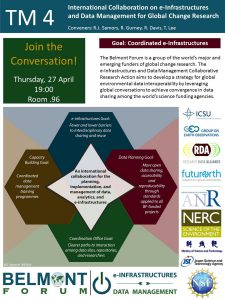 EGU Town Hall: International Collaboration on e-Infrastructures and Data Management for Global Change Research
EGU Town Hall: International Collaboration on e-Infrastructures and Data Management for Global Change Research
Thursday, 27 April, 19.00 Room .96
This Town Hall will highlight the progress and accomplishments of the Belmont Forum e-Infrastructures and Data Management (e-I&DM) Project toward its goal of accelerating open sharing and improved management of scientific, global change research data and discoveries across scientific disciplines, agencies, organizations, and geopolitical boundaries. Please join the e-I&DM team for a robust discussion of ongoing data management challenges for collaborative interdisciplinary, international research and possible solutions.
Data Skills Training Curriculum Development Workshop
Friday 28 April, 08.30-16.30
Vienna Marriott Prater-Messe
This discussion-style workshop will explore the elements to include in a data skills curriculum to help non-data scientists become more “data smart” in order to accelerate open data sharing, increase reproducibility and improve data management/curation. There are very limited spaces still available. If you have experience in capacity building or training development and are interested in participating, please contact the BF e-I&DM secretariat for more information.
The workshop will bring together global environmental change and earth science research specialists to test the results of a data skills gap survey undertaken in late 2016 by the Belmont Forum e-Infrastructures & Data Management Project, with the aim to establish the foundations for digital skills training requirements across the breadth of Belmont Forum-relevant disciplines. ‘Digital skills’ include, but are not limited to, research data management skills, data deposition and sharing, and software/programming/modeling capabilities. The conclusions reached at the workshop will form a critical part of recommendations of key curricula to the Belmont Forum Principals at their annual meeting in November.
Activities
By implementing the recommendations laid out in the Community Strategy and Implementation Plan (CSIP), the Belmont Forum can blaze a path toward achieving high quality, reliable and multidisciplinary global change research enabled by a sustained human and technical, internationally coordinated and data-intensive e-infrastructures. Current activities are undertaken by separately funded Action Themes. These activities are coordinated and supported by a virtual Communication, Collaboration and Coordination Office (Action Theme 1). Data planning and data stewardship (Action Theme 2) develops data management outlines, templates, and methodologies; e-infrastructures (Action Theme 3) has held a series of scoping activities to identify and explore common barriers to data sharing; and the human dimensions/capacity building action is identifying elements for an optimal training curriculum (Action Theme 4).
These themes work together to reach medium-term goals such as creating a data management template for Belmont Forum projects, identifying best practice exemplars in data sharing, training methods, and curation through workshops, and ongoing outreach to collaborate with groups connected to data management and global change research.
Collective outputs of these Action Themes to date are listed below.
Resources
The Data and Digital Outputs Management Annex (DDOMP) requests specific data management information of all Belmont Forum CRA proposers. Starting in mid-2018, pre and full proposals include basic questions about data value, budget, and approaches.
A Skills Gap Analysis released in April 2017 is based on a survey conducted among over 150 domain and data scientists to identify priority challenges in data management by researchers.
Lightning talk presentations from the Data Skills Curricula Development Workshop (Vienna, Austria 2017) feature training and capacity building ideas from international experts
Presentations from the e-Infrastructures Scoping Workshop (Paris, France, 2016) by multi and transdisciplinary projects in the field of global change research report input on the barriers, training gaps and challenges, as well as the innovations and solutions, that researchers are finding with relation to e-Infrastructures and Data Management.
Reports
The Community Strategy and Implementation Plan (CSIP), the final report of the scoping phase, written for the Belmont Forum Principals, describes the recommendations and the rationale for Belmont Forum adoption. It provides detailed appendices with precise descriptions of the Action Themes, their implementation and validation.
The Community Edition is a shorter document overall, but includes the background of the Belmont Forum and summarizes the steps toward implementation in the body of the text.
A slide set on the conclusions and recommendations of the final report is available for any one to use, either whole, in part, or as a basis for an original presentation.
The project Secretariat is developing a list of news media which may be interested in following progress of the project. If you have an idea for a publication, a story, or a media contact, please contact the Coordination Office.
Recommendations
In March 2017, a revised Implementation Plan was publicly circulated as a living document describing objectives, tasks, and roles for implementation of the recommendations outlined in the CSIP. The CSIP specified five recommendations that could be best carried out by the Belmont Forum:
- Adopt Data Principles
- Foster communication, collaboration and coordination between the wider research community and the Belmont Forum
- Promote effective data planning and stewardship in all research funded by Belmont Forum agencies
- Determine international and community best practice to inform e-infrastructure policy for all Belmont Forum research
- Support the development of a cross-disciplinary training curriculum to expand human capacity in technology and data-intensive analysis methods for global change research
Action Theme 1: Coordination

A Coordination Office fostered collaboration between project areas and promotes cooperation among global e-Infrastructure initiatives.
A virtual Communication, Collaboration, and Coordination Office (known as the C3O, or Coordination Office) fostered ongoing communication and collaboration among the e-I&DM Action Themes and the public, and identified opportunities for coordination among existing e-infrastructure initiatives.
Headed by a Coordination Officer, the office worked to coordinate and integrate e-I&DM activities crucial to the success of all Belmont Forum projects by better leveraging the projects undertaken by individual Action Themes, sharing best practice and promoting interoperability.
Four “Champions” identified by all four Action Themes (Data Planning, e-Infrastructures and Capacity Building) formed the Secretariat Coordinating Group (SCG). The SCG acted as a coordinating committee for the initiative’s activities and milestones. The C3O and its staff worked with SCG to execute e-I&DM project objectives.
Additionally, the C3O maintained communication with an Oversight Committee (OC) comprised of representatives from agencies relevant to transdisciplinary research and management of scientific data. Organizations represented in the Oversight Committee included Future Earth, CODATA, RDA, GEO, ICSU-WDS, and various international data management initiatives with ties to the Belmont Forum.
The C3O hosted conference calls, maintained the project Teamup Calendar, and planned outreach activities such as presentations, workshops, and networking events at international scientific and data conferences. The C3O also hosted the e-I&DM project’s semi-annual in person meeting. In addition to providing overall project coordination, the C3O was responsible for maintaining the Knowledge Hub, producing a map of the data landscape, and liaising with the greater e-Infrastructures community.
Action Theme 1 Leadership
The role of Coordination Officer was held by Robert (Bob) Samors, in which he coordinated and liaised with e-I&DM project leads, Action Theme co-leads, stakeholders, Advisory Board members, and other international partners in the adoption of data principles and best practices, promotion of effective data planning and stewardship, and development of an international training curriculum to enable practitioners to put these principles and practices into action, with a goal of making these resources and practices available and implemented in Belmont Forum activities and funded projects.
Coordination duties were supported by project coordinators from the Arizona Geological Survey.
Resources
Presentations and Videos
- Video Playlist: Belmont Forum Integrated Training
- Webinar: Open Data In Global Environmental Research
Data Policy Comparison Tool
The Policy Comparison tool granularizes information from 20 Belmont Forum and science funding agencies to allow side-by-side comparison of data policy elements, such as how and when to share research outputs. Compare up to three agencies at a time.
Inspired by and developed with cooperation from SPARC Policy.
e-I&DM Project Implementation Activities
- The Implementation Plan describes the coordination of four interrelated programs and five international funding agencies that leverage existing knowledge and resources to illuminate achievable, reproducible systems for effective, sustainable data management practices. Actions, goals, and project deliverables between 2016-2020 are outlined.
e-I&DM Implementation Plan (Revised March 2017) - The e-I&DM Priorities and Next Steps presentation outlines the key achievements and future directions of the e-I&DM project.
e-I&DM Priorities and Next Steps (2018 Plenary Presentation)
Scoping Phase (2015)
This collection includes the final reports and presentations summarizing the outcomes of the 2-year Scoping Phase (2013-2015). These documents are all based on the final report of the scoping phase released between June-August 2015, entitled the “Community Strategy Implementation Plan.” These documents provide background information and descriptions for the Action Theme approach.
Action Theme 2: Data Planning
The Data Planning Theme helps promote active and effective data management and stewardship in all Belmont Forum funded research, and works to enable harmonization of e-infrastructures through enhanced project data planning, monitoring, review and sharing.
The primary goal is to coordinate an approach to long term data management over the life cycle of research projects by incrementally integrating tools and policies for optimal project planning and budgeting. A goal was to develop a data management section for all potential Belmont Forum projects, possibly generating a Data Management Plan that will cover the management of data, connection of the data to associated context, facilitating the discoverability of the data, and ensuring that the data is capable of reuse/exploitation.
The Theme convened and participated in working groups regarding key issues associated with data management to ensure the viability and global harmonization of ideas. Data publishers, for instance, safeguard and disseminate untold amounts of research data, and play a key role in access to scientific information. Likewise, security and legal interests ensure that data are protected and fair.
The Data Planning Theme also explored issues associated with budgeting and the cost of long-term data management, identification of key repositories, and the establishment of metrics and review mechanisms.
Resources
Data Accessibility Statement
The key deliverable of the Data Publishing Policy Project (DP3), the Data Accessibility Statement and Policy (DAS) connects scientific publishing to the research data produced by the project by articulating where and how the data used in a given article can be accessed.
Data and Digital Outputs Management Plan (DDOMP)
The Data and Digital Outputs Management Plan (DDOMP) annex was released in May 2018 to encourage consideration of data management questions by applicants to Belmont Forum funding opportunities. Beginning in 2018, all Belmont Forum CRAs are required to answer questions from this document.
The DDOMP asks researchers to consider the costs, value, and sustainability of their research data in the pre-proposal stages of the application process, and calls for a development of a project-specific data management plan during the award stage in order to promote accessibility and re-use of research data and other outputs produced by Belmont Forum research teams.
The DDOMP annex was based on several earlier drafts of data management documents. Data management considerations of earlier Belmont Forum CRAs including T2S/SUGI (2016) and BioDivScen II (2017) are based on earlier versions of this document.
Data Publishing Policy Project (DP3) Outreach Materials
The DP3 has been co-developed by the Belmont Forum and members of the science publishing community to develop end-to-end expectations for research data format, accessibility, and sustainability between research teams and science publishers. Goals and products of the DP3 align with the Data and Digital Outputs Management Plan (DDOMP) requirements incorporated into all future Belmont Forum Collaborative Research Actions (CRAs) or funding calls.
By linking the language and expectations of the DDOMP with the DP3 initiative, funders and publishers will articulate a coherent set of data and research outputs management expectations for researchers, with the ultimate result of improved sharing and re-use of research data.
Materials include presentations at conferences, workshop reports, and other outreach materials developed during the course of the Data Publishing Policy Project. Includes all presentations from an Open Data Publishing Policy workshop convened on 23 May 2017 in London, England for science funders, publishers and other key stakeholders to discuss the mutual goal of exploring ways to achieve sustainable open access to research data.
-
- OASPA 2019 Webinar
- Researcher to Reader Workshop Summary
- Publishing Policy Workshop Presentation 1 – Gurney
- Publishing Policy Workshop Presentation 2 – Hrynaszkiewicz
- Publishing Policy Workshop Presentation 3 – Dallmeier-Tiessen
- Publishing Policy Workshop Presentation 4 – Carr
- Publishing Policy Workshop Presentation 5 – Haak
- Wellcome Trust Efforts toward Open Science – David Carr
- Publishing Policy Workshop Presentation 8 – Mokrane
- Publishing Policy Workshop Presentation 9 – Ganley
Data Planning Archives
These documents include early versions of data management language and documents that have been developed by CRAs. Please see the Data and Digital Outputs Management Plan (DDOMP) for the most recent language.
Version Date of Revision Lead Author(s) Relevant CRAs Notes 1.0 1 October 2016 R. Samors SUGI/T2S First draft based on requirements of several funders. 1.2 8 November 2016 R. Samors and M. Thorley Version shared with 2016 Belmont Forum Plenary. (not available online) 1.3 1 March 2017 C. Seltzer and M. Thorley Added budget question. (not available online) 1.4 29 June 2017 C. Seltzer and M. Thorley BioDivScen II Combined contextual justification and more specific guidance documents. Differentiated expectations for different stages of the proposal and award process. 1.5 18 January 2018 C. Seltzer Added context and incorporated cyber security considerations. (not available online) 2.0 8 February 2017 C. Seltzer All since 2018 Broadened scope to include “other digital outputs” in addition to data. Current Data and Digital Outputs Management Plan (DDOMP) template used in CRA development starting in 2018. SEI Annex May 2018 J.P. Vilotte SEI The Data and Digital Outputs Management Plan Annex was released in May, 2018 and describes data management requirements for the Belmont Forum Science-Driven e-Infrastructures Collaborative Research Action in pre-proposal, proposal, and award stages. Based on the Data and Digital Outputs Management Plan (DDOMP) released February, 2018.
Action Theme 3: e-Infrastructures

E-Infrastructures Exemplars examines critical barriers to data sharing.
Action Theme 3 steered development of the Belmont Forum Collaborative Research Action (CRA) known as the Science Driven e-Infrastructure Innovation (SEI) for the Enhancement of Transnational, Interdisciplinary, and Transdisciplinary Data Use in Environmental Change Research. The SEI call was released on 16 April 2018 with participation from ANR (France), FAPESP (Brazil), MoST (Chinese Taipei), JST (Japan), and NSF (US). The goals of the call included identifying the most critical e-infrastructure issues to address in order to facilitate adherence to the Belmont Forum open Data Policy and Principles.
A scoping workshop in Paris, France was hosted by ANR in November 2016 to identify existing data management strategies for cross-disciplinary research projects already being carried out under the Belmont Forum, Future Earth, GEO or other international initiatives and build on them. Subjects included matrix analysis preparation, use cases analysis, and DMIP and call scoping.
Examination case studies into the way researchers use data and e-infrastructures in large interdisciplinary investigations helped determine community best practice. Reports from the case studies were used to inform the development of the data management template developed by the Data Planning Action Theme, to illustrate weaknesses (and strengths) in existing e-infrastructures and to provide evidence to advise on the technical implementation of future e-infrastructures.
A concept note and annex was presented to the Belmont Forum Principals for approval as a Collaborative Research Action at their Plenary Meeting In November 2017. The proposition was approved to move forward, and the early months of 2018 were spent negotiating to secure multinational funding for development of this e-infrastructures-oriented project or integration of data management tools into existing calls.
From January 2016 to July 2017, the role of e-Infrastructures Champion was dually fulfilled by Mark Asch and Jean Pierre Vilotte of ANR, in collaboration with team members from MoST and JST. Dr. Vilotte assumed the role of project lead when Mark Asch stepped down.
Resources
Science Driven e-Infrastructure Innovations CRA
Projects financed by this Call will bring domain scientists and information and communications technology (ICT) experts together to produce demonstrators of concrete, scalable solutions that are relevant to the larger scientific community and which accelerate the full path of data use across existing data and computing infrastructures, as well as the knowledge life cycle, from data acquisition all the way to decision-making.
Exemplar Scoping Workshop
The 2016 BF e-I&DM Exemplar Scoping Workshop collected input on the data management barriers, training gaps and challenges, as well as the innovations and solutions, experienced by researchers conducting international, transdisciplinary collaborations. A contingent of scientists representing multi and transdisciplinary projects in the field of global change research made presentations that helped inform the SEI CRA, as well as aspects of the Data Planning and Capacity Building Action Themes.
- Exemplar Scoping Workshop Presentation 1.1a – Introduction
- Exemplar Scoping Workshop Presentation 1.1b – e-I&DM
- Exemplar Scoping Workshop Presentation 1.2 – Denvil
- Exemplar Scoping Workshop Presentation 1.3 – Ikoma
- Exemplar Scoping Workshop Presentation 1.4 – Joussaume
- Exemplar Scoping Workshop Presentation 2.1 – Fitton
- Exemplar Scoping Workshop Presentation 2.2 – Reys
- Exemplar Scoping Workshop Presentation 2.3 – Goor
- Exemplar Scoping Workshop Presentation 2.4 – Dumont
- Exemplar Scoping Workshop Presentation 2.5 – Cheddadi
- Exemplar Scoping Workshop Presentation 2.6a – Maso
- Exemplar Scoping Workshop Presentation 2.6b – Maso
- Exemplar Scoping Workshop Presentation 2.7 – Grant
- Exemplar Scoping Workshop 2.8 – Lin, Chu
- Exemplar Scoping Workshop Presentation 2.9 – Wallom
- Exemplar Scoping Workshop Presentation 2.10 – Bretonniere
- Exemplar Scoping Workshop Presentation 2.11 – Zolina
- Exemplar Scoping Workshop Presentation 2.12 – Berkman
- Exemplar Scoping Workshop Presentation 2.13 – Camera
- Exemplar Scoping Workshop Presentation 2.14 – Ellis
- Exemplar Scoping Workshop Presentation 3.1 – Sovari
- Exemplar Scoping Workshop Presentation 3.2 – Hugo
- Exemplar Scoping Workshop 3.3
Science Driven e-Infrastructure Innovation (SEI) Development
The following documents describe the development of a three-to-four year competitive Collaborative Research Action (CRA) funding call released by the Belmont Forum in April 2016. The CRA hopes to provide targeted support to initiatives that are well-positioned to solve one or more of the methodological, technological, and/or procedural challenges currently facing environmental science researchers working with large, complex, and multi-source data sets. Projects financed by this Call will bring domain scientists and information and communications technology (ICT) experts together to produce demonstrators of concrete, scalable solutions that are relevant to the larger scientific community and which accelerate the full path of data-use across existing data and computing infrastructures, as well as the knowledge life cycle, from data acquisition all the way to decision-making.
Action Theme 4: Capacity Building and Human Dimensions

Capacity Building was aimed to give Belmont Forum researchers skills to manage, access, and reuse data across nations, domains, and disciplines.
The demand for data skills among scientific researchers is growing. As the realm of data-enabled science expands, it becomes more and more important for researchers to have the skills to effectively find, understand, and reuse existing data, and to create data that are accessible to other scientists and the public. Moreover, transdisciplinary research poses the special challenges of cross-cutting work in multiple domains and social science. This type of research produces a spectrum of project outputs that may not always fit with the typical data management process. Therefore, one of the main objectives of the e-I&DM project was developing a workforce that combines a well-developed understanding of environmental, social and health science with skills in data science, data-handling and computational methods and technologies.
The goal of Action Theme 4 was to research ways that the Belmont Forum could:
- support the development of a holistic training and education curriculum in data-intensive environmental science, for delivery to environmental, social and computer scientists; and
- launch the curriculum through the creation or endorsement of international short courses, immersive winter and summer schools, and online learning modules.
Video Training Module Playlist
Three videos developed by Dr. Wade Bishop present a practical introduction to data management principles and why they are important. The “Why Data Management” (BF DMT Module 1) discusses the benefits of sound data stewardship, including verification, replication, value, and reuse. The “How Data Management (BF DMT Module 2)” walks researchers through creation of an original Data Management Plan using the Data Curation Profile approach. The “Additional Considerations for Data Management (BF DMT Module 3)” offers a deeper look at ideas important to data sharing and management, including digital repositories, persistent identifiers, and data citation and licensing. Videos are available on the Belmont Forum YouTube Channel.
Data Management Toolkit
The Data Management Toolkit draws from free global materials analysed and referenced during development of the Curricula Framework to present a curated gallery of simple, effective data skills training resources. Materials from DataONE, FOSTER, the ESIP Data Management Training Clearinghouse, and many others, as well as original trainings developed by Belmont Forum member agencies are arranged coherently to guide Belmont Forum researchers to the skills necessary for sound data planning, management, and stewardship throughout the life of their research projects. (Videos on how to use the Toolkit are available on the Belmont Forum YouTube Channel).
Curricula Framework
A Data Intensive Skills Curricula Framework was released in September 2017 and endorsed by the Belmont Forum at its annual Plenary Meeting in November.
The Curricula Framework outlines the critical elements of training meets these challenges with courses developed around five skills:
- Programming
- Particulars of environmental data
- Visualization
- Data management
- Interdisciplinary data exchange
This Framework accommodates three specific audience levels: core skills to promote reproducibility and efficiency, a Principal Investigator course on team needs, planning, and management considerations throughout the entire data life cycle, and an optional section to introduce those with autonomous tasks to explore wider skills.
The recommendations report is supplemented by an outcomes report, which details background information and practical considerations for the execution and delivery of the Framework.
Course Development
Results from a data skills survey deployed in December 2016 to researchers and data managers generated a Skills Gap Analysis. The Analysis was reviewed during a Data Skills Curricula Development Workshop held in Vienna, Austria in April 2017. The workshop convened training experts from around the world, including representatives from CESSDA (European Social Science), CODATA, FOSTER, ESIP, DataONE, and more. Participants offered insight on curricula development, development and deployment of training, optimal outcomes, and a process for community consensus and renewal.
Resources
VIDEO PLAYLIST: DMP Development for Researchers
Presented by Dr. Wade Bishop, the data management training videos use the Data Curation Profile method to help researchers develop specific, effective data management plans for their projects, explain the benefits of sound data management practices, and explore the Data Skills Toolkit.
- Why Data Management (BF DMT Module 1) discusses the benefits of sound data management practices, including verification, replication, value, and reuse.
- How Data Management (BF DMT Module 2) describes data management plans, tools and considerations. Viewers observe the process of developing a data curation profile, a helpful step in developing specific, useful data management plans.
- Additional Considerations for Data Management (BF DMT Module 3) offers a deeper look at ideas important to data sharing and management, including digital repositories, persistent identifiers, and data citation and licensing.
- The Toolkit Training videos explore the resources in the online Data Management Toolkit, how to access them, and how they can be helpful in development of a data management plan according to the Data and Digital Outputs Management Plan Annex.
WEBINAR: Data Skills Curricula Framework Implementation
On 19 April 2018, a one hour webinar was held to offer introductory information about a collaboratively developed Belmont Forum Data Skills Curricula Framework by a key author for the Framework, Vicky Lucas. Ms. Lucas’ presentation was followed by a Q&A, and discussion on collaboration opportunities, development options, and related topics.
The webinar was an early step toward the goal of coordinating ongoing collaboration with a number of international data skills training programs and groups.
The webinar was co-hosted by the Belmont Forum e-Infrastructures and Data Management project, ESIP’s Data Management Training Working Group, and the AGU/RDA/ESIP FAIR Data project.
Data Skills Curricula Framework
The documents of this work product describe a data skills curricula framework that will enhance and coordinate data-related training for Belmont Forum researchers. In 2015, the Belmont Forum e-Infrastructures and Data Management scoping phase recommended that a “curriculum was required to expand human capacity in technology and data-intensive analysis.
The outcomes of supporting work and resulting recommended curricula are presented below.
The recommended core modules are designed to enhance skills of domain scientists specifically to make data handling more efficient, research more reproducible and data more shareable – including visualisations for end-users. The five core skills emphasized include programming, particulars of environmental data, visualisation, data management and interdisciplinary data exchange. A number of optional modules are suggested for more established researchers which would be useful introductions to widen their data skills and provide new options for examining and processing data, such as machine learning and object-orientated programming. Two modules included are briefings aimed at Principal Investigators, providing an overview of data management and skills.
Skills Gap Analysis
The skills gap analysis is based on a survey completed by current practitioners in fields of research and data management of global change research and secondly on additional information gathered from complementary global organisations and professionals. The survey includes a catalogue of recommended existing training activities relevant to the Belmont Forum.

